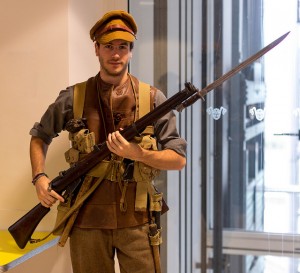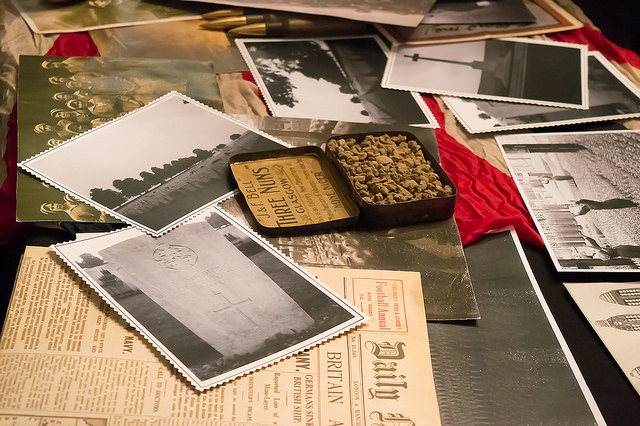In July, we launched our children’s WW1 writing competition in partnership with Nidderdale AONB. From 135 entries from all over the UK, our judge in the 12-16 year category, Susan Burnett chose the following three entries as her winners.
In first place, Sacha Rines from Bournemouth for her short story, Passion in Passchendaele.
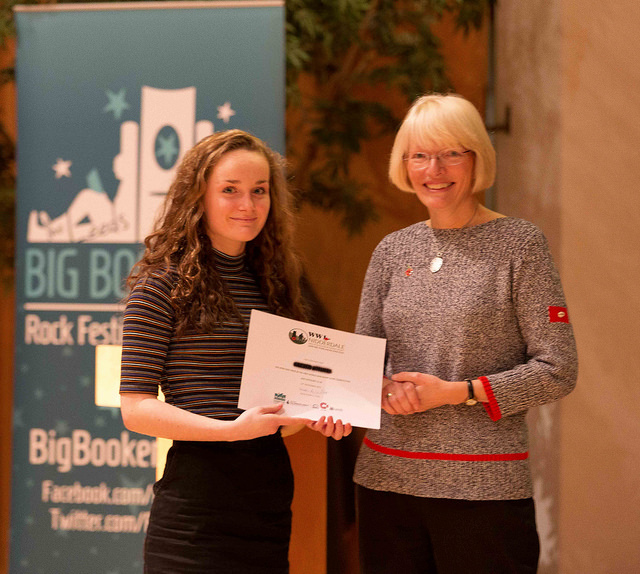
Rats weaved in and out of the mighty surge of the lahar, which ran unhindered along duckboards and weathered boots alike, threatening to inhale any who dared tread into it. My thoughts would’ve drifted, if the danger of being ingested and thus suffocated by the mud had been non-existent, or if I only could adjust to the cries of anguish and the booms of shelling that never failed to startle me. They always came when I was about to dissolve into daydreams. Most of them were about Helena. She was bad for a chap’s health really. Not only did she make my heart swell and wheeze most alarmingly in her company, but she was omnipresent in my thoughts, mainly in times when I was most likely to be shot at. But that’s love for you, I suppose.
I was glad to be gone, as I trudged down the communication trenches towards the town. My ears fought against the clashes and crashes that were still in hearing range, instead bombarding my brain with the imagined, gentler noises of the past few weeks, consisting of cups of tea clinking, the rasping of a smoker, the quiet rumble of tension and far-off sound of gunfire, which spiked the ill-gotten relief that today it was someone else’s turn to die, not ours. The guilt, when you came across fellows who lamented the death of their comrades, especially after rejoicing in the relief, gave you a sense of guilt that only Will could shake off and even then, only partially.
Will was my best friend, possible associate of the devil and an all-round lady’s man. When nearly all of his regiment had been victims of a truly horrendous gas attack (when are they anything else?), either rendering them blind or opening their eyes to the afterlife, he’d been sent to us: the 2nd East Surrey Regiment. We’d just been stationed at the Front for three and a bit weeks. Consequently now, I was trying my best to picture Helena’s platinum, free-flowing locks, in order to stop myself replaying the gory reality. In particular, I was pretending to myself that I hadn’t watched my brother being shot for desertion. Well, the actual viewing of it was my own fault, the rest of the blame lay at the foot of the British Army.
I turned my attention to above the men trooping onwards, dogged and bearing an exhaustion that I knew all too well. No, I wasn’t appealing to the Lord. I was regarding the oasis of rest and possible comfort that arced upwards in the distance. In other words, Poperinge, or Poppers as we all called it. There we would get our wages, get some beer and then get absolutely drunk, until our eyes fell out and we could no longer feel. Well, that’s what Will’s plan was anyway and to me it sounded like he had grasped the right end of the stick.
It turned out to be one of those plans that were stowed away for a later date, as by the time the sun had dipped in earnest, threatening to titter over the horizon and be lost to us, we arrived too spent to do much more than collapse into our barracks and sleep. Sleep, no matter how tired you were or strenuous the activities of the day, was rotten. Lurching back and forth between the nightmares and reality’s brusque bite, it was enough to make you feel seasick.
The plan didn’t come into fruition until the next night, where at some stage I found myself at a maison tolérées (presumably through Will’s interference). A franc shoved in the hand of the Madame rewarded me with a brunette. Where I adored the glossy blonde hair, I was given the cropped brown. Where crisp lime irises appraised me with affection, I was given the hardened hazel. Where a dainty mouth kissed me lightly with that schoolgirl pout, an oversized specimen taught my body of various pleasures and joys.
Then, before the act was even part way through, I started crying.
Whispering intelligible French phrases, she comforted me, understanding bleeding through her naked form into mine. She may have been plain, an object for sins, but she knew better than Helena ever could. She was a compatriot, a comrade, a victim too. Perhaps even a survivor.
I found myself thinking of her many weeks later at the first rays of sunlight, spilling a less-than-loving glow into the trench and causing uneasy looks to bulge through the men’s eyes. At the command, we formed a line to fight the foe. But how much was fictitious? ‘Know thy enemy’. We didn’t though, though Will did reckon they were Godless, conscripted sods. Not so different from ourselves.
Step forward. Clunk. Nervous. Sweat. Prayers. Her eyes flicking upwards, drilling into mine to see if her shift was over. Then silence. Trembling. Guns levelled. Her tongue encircling my mouth, teasing and torturing my captured mouth in equal measures. Quivering fingers. Silent farewells. Dead men breathing. Forgiving and forgiveness. Dread. Cold, hard dread lodged in my throat. It was either run forward to be shot or run back to be shot by your own.
Then the whistle went and my last thought was of her, the soft body moulded against mine and the heartbeat strumming for the both of us like a countdown.
Fathers. Uncles. Brothers. Sons.
They all fell one by one.
None surviving. All gone.
Doomed ‘til the war was won.
Someone would cry for them, sigh for them,
Until another generation’s war heroes,
Those also to be condemned and condemn.
Judge, Susan Burnett said of Sacha’s winning entry: Sacha’s story brings in the perspective of the women working in the brothels behind the lines and the impact this has on one soldier. It is a memorable story and one with a different angle, saying that these women were also victims of the war and would also be ‘survivors’ after the war had ended. I love the way the French woman intermingles in the soldiers mind with Helena, his love at home, so you are not entirely sure who he is thinking of when he dies. Good descriptions of the camaraderie of the two men, the horrors of the trenches all interspersed with the story of the woman, which is very well done. There is a really good use of language, such as ‘reality’s brusque bite’. Phrases such as ‘she was bad for a chap’s health really’ and ‘the ill-gotten relief that today it was someone else’s turn to die’. There are also brilliant descriptions ‘noises …consisting of cups of tea clinking, the rasping of a smoker’. A great title too!
In second place Elisei Ulrich-Oltean from Leeds for his short story, Hometime
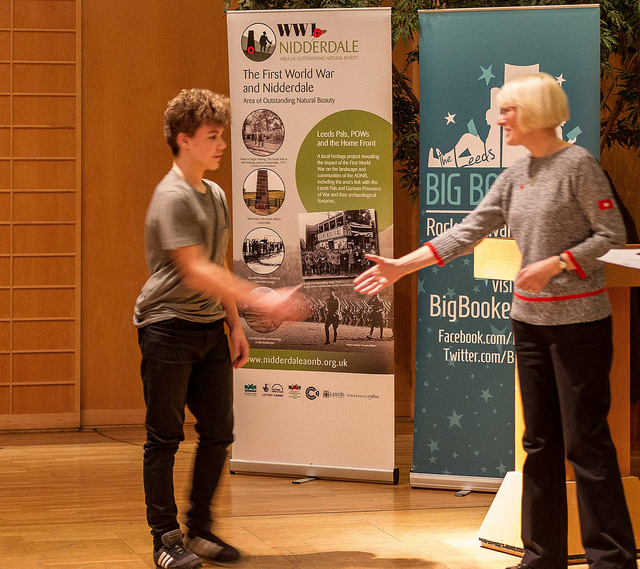
The war is over. At last. We’re coming home. The noise of the celebrations around us ring dead in our ears, joyful singing for thousands of corpses, accompanied by empty music. Flashbacks dance on the edge of my memory, my mind wrestling to push them out, but it is like trying to push away mist with my bare hands. Red and black flash in front of my eyes and I mentally collapse.
Explosions rocket around my ears and gunpowder competes with blood to control my sense of smell. Earth sprays my tattered uniform and soaks my freezing skin. Rats scuttle around my half buried feet, and I desperately grip my rifle. Steeling myself, I turn my battered head to the left, surveying the carnage. I see James – what’s left of him at least – and so much dirty red mud. Except I know that most of it isn’t mud. Blood. Guts. Skin. I turn my head to the right and –
“Will! WILL!”
The friendly shouts drag me from my flashback and drop me back in the real world. More explosions and blooms of bright colours amidst the grey and brown. I look gratefully at Cyril, who smiles back with a look that says more than any words how much he understands what I’m going through. I remember exactly where my old house is, right where I left it three years ago. I’ll be twenty soon. I say goodbye to my friends with many tears from what’s left of my face. Cyril. Big James. Sydney. Those are all that’s left of the nine smiling boys who left home those three long years ago. I turn round the corner and –
I dive to the floor. Mud pushes its way into my eyes and grains of dirt infiltrate my mouth and nose. Slivers of skin gently desert my arms as they charge through the floor of the trench, kicking up clouds of brown. A violent cough rides through my body on a wave of pain, and I wonder for the millionth time why I thought it was a good idea to sign up. It’s just then that I look up and see –
My senses regain control of my tattered mind and I cough again, with less ferocity than that time in the trench. I rub my eyes and trace the flaps of half healed skin on my cheeks. There isn’t far now; just to the left of the old church I have to turn off, right after the butcher’s on the corner and then it will be my home street. Home. The blessed haven which was my only incentive to keep going through the war, so I could come back to one of my mother’s cups of warm cocoa. I envisage it, just how she makes it, and almost close my eyes again. But I don’t. I take the turn after the church, and the sounds of celebration gradually seep out of my hearing. I laugh bitterly to myself. Hooray for pain, death and loss. Celebrate. I wrap my scarf tighter around my hooded face and look around. I see the butcher’s, blood dripping from the carcasses of innocent animals, and the blood drips into my head, down into my eyes and then –
I’m slowly rubbing away the stinging, stinking gunge from my eyes. I notice Thomas slumped against the bank and desperately scramble to my feet, slipping in the toxic soup of blood, rainwater and earth. My feet move like a machine, and whistling fills my ears. They are probably damaged, but when I rub them the whistling doesn’t go away, it intensifies. And then I know. It’s a mortar. I’m going to die. I don’t want to die. NO! I’m going to save Thomas. I crawl as fast as I can towards the limp slab of marble with the face of my friend and dive for it. Seizing the cold, wet shoulders I battle to make my arms obey me. The whistling is too loud now and I won’t make it and Thomas might not even be alive, and I, I, I still carry on dragging him. The mortar thuds into the ground a score or so metres away. And, and, and… I dive to the floor and throw Thomas in the way of the blast. Wretchedness engulfs me long before the explosion. Thomas’s body takes the main force of the blow; I watch him fly apart as of in slow motion. Then, as if by divine punishment, his battered helmet flies straight at my face and that’s the last thing I see before I –
My eyes struggle open against the tide of memories and I pause, shuddering. Thomas was already dead. I’ve told myself that ever since my face was ruined in that blast. Miraculously, my eyes survived, but I look like a monster. But my mother will recognise me. I pass the butcher’s and now I’m on the long street with my home on it. I pass Old Betty’s sweet shop and remember lovingly the delicious sweets that she used to sell. I look to the other side and my vision lazily wanders into the old bookshop, my nose remembering the musty papers and rustling. Whatever’s left of my nose, at least. I stumble up the familiar steps of my house, and my legs are telling me that I’m wading through water. Or blood. They can’t tell the difference now. My eyes spread themselves over the bright red door, repainted by me and father countless times. My trembling hand unfurls from my quivering arm and tentatively feels the rough wood. I take a deep breath and knock, hard. The sound of footsteps advances on me like an enemy shoulder and I draw myself up. The door swings open and there is mother, resplendent in a pink bathrobe. I gasp in amazement… she looks just the same. I freeze.
“Hello? Can I help you?” she asks softly.
“Mother?” I reply tentatively, pushing down my hood to reveal my tattered face.
Judge, Susan Burnett said of Elisei’s winning entry: This story has a fantastic ending that leaves you thinking about Will’s future – not just immediately as he has to tell his mother who he is, but his life over the many years to come. His mind is full of flashbacks and his injuries make him unrecognisable. Like many young men who returned, their lives had been turned upside down and they had an uncertain future, often with serious mental health problems. The writing is very descriptive and gives clear notion of the horror of the trenches. This is not the descriptions usually given by writers who write about the trenches. Putting the flashbacks in italics works well. The analogies work well too – of the blood in the butchers window and the red of the front door.
In third place Emma Madden from Leeds for her poem, The Dovar’s War
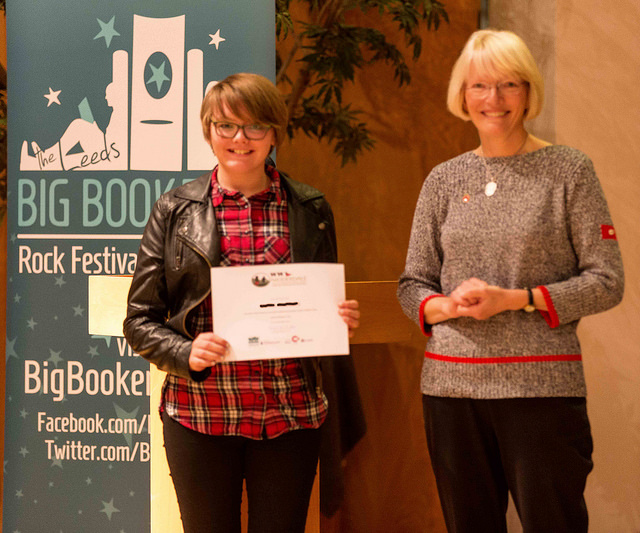
1914
The war men came today
Shining boots in THE army
I’ll be a hero they say
Their army, MY army – Jerald Dovar, age 16
1915
Be a hero they said
Get shiny boots in THE army
I’m 19 I said
17 in THEIR army – Jerald Dovar, age 17
1916
Training is over
Time for real war
Good bye to my Lover
Daisy Dovar – Jerald Dovar, age 18
1917
So many killed
So many lost
I cannot sleep
Only turn and toss – Jerald Dovar, age 19
1918
In no mans land he roamed
So much he must’ve seen
If only he came home
What a hero he’d have been – Daisy Dovar, 20
Judge, Susan Burnett said of Emma’s winning entry: Superb interpretation of the story – is it a real family? So simple but says so much. I loved it. I re-read it several times to appreciate the language used by the Dovars at different ages- at 16 the language is simpler and a 16 year old would have been impressed by the war. So sad at the end with Daisy Dovar’s stanza.
A huge congratulations to our winners, Sacha, Elisei and Emma for their stories and poem. You can read entries from the winners of the 7-11 year category here. Thank you to everybody who entered, our judge Susan Burnett and our partner in the competition Nidderdale AONB.
